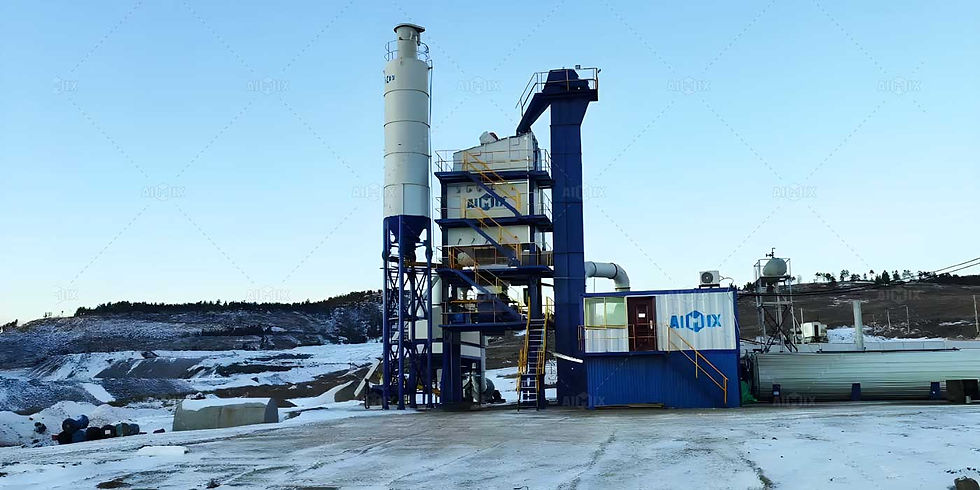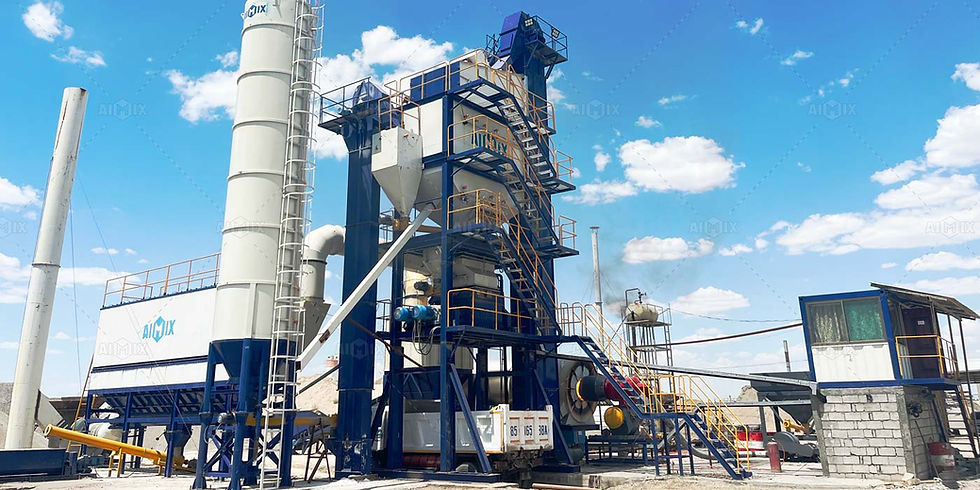Is a 20–30 TPH Mobile Drum Mix Plant Enough for Low-Traffic Village Road Construction?
- aimixglobal5
- May 27, 2025
- 3 min read
When planning small-scale road construction in rural areas, choosing the right asphalt mixing plant is essential. For low-traffic village roads, a 20–30 TPH (tons per hour) mobile drum mix plant often becomes a common consideration. But is this capacity really enough? In this article, I’ll walk you through real-world scenarios, practical insights, and the reasons why a 20–30 TPH mobile drum mix plant could be the smart choice for your project.

Understanding the Needs of Village Road Projects
Before deciding on plant capacity, it’s important to understand the actual demands of rural road construction. Unlike highways or city roads, village roads usually:
Have lower daily traffic volumes
Require shorter road lengths
Involve fewer lanes and narrower widths
Are built for lighter vehicles, such as motorcycles and small trucks
Because of these characteristics, the required asphalt volume is relatively low. This means a large, high-capacity plant could be underutilized and wasteful. That’s where the 20–30 TPH small portable asphalt plants for sale enter the picture.
Why a 20–30 TPH Mobile Drum Mix Plant Matches Village Road Jobs
Let’s look at the logic. If you're building or repairing a village road 3–5 meters wide and a few kilometers long, your daily asphalt requirement rarely exceeds 300–400 tons. A mobile drum mix plant with 20–30 TPH capacity can easily supply that volume over one or two shifts.
Even if the job site is remote, you don't need to overinvest. This plant size keeps your operation lean, mobile, and cost-effective. Plus, mobile plants are fast to set up and easy to relocate. That’s especially useful when roads are spread across several villages or districts.
Save Costs, Maintain Efficiency
Smaller capacity doesn’t mean you sacrifice quality. These plants still include essential components like a cold aggregate feeder, drying drum, burner, and control panel. With proper maintenance and operation, you’ll get consistent asphalt mix quality suitable for low-volume roads. And because you're producing just what you need, fuel and material usage stay efficient.

Real Scenarios Where 20–30 TPH Makes Sense
To make things clearer, here are a few real-world cases where this capacity is just right:
Village road paving: A 5-kilometer village road, 3.5 meters wide, may only need 700–900 tons of asphalt. This could be completed within 3–4 days using a 20–30 TPH plant.
District maintenance jobs: For patching or re-surfacing rural roads in multiple small areas, mobility is key. A compact mobile plant helps you move quickly between sites.
Local government infrastructure projects: Many public works departments allocate limited budgets for rural projects. A lower-capacity mobile plant helps you stay within budget while delivering results.
Clearly, for contractors focused on small-scale, distributed road jobs, this type of plant delivers a practical balance between output, investment, and flexibility.
What If My Project Grows Later?
This is a valid concern. You may start small, but local government may ask you to extend the road or work on nearby routes. Fortunately, most mobile drum mix plants in the 20–30 TPH range support modular upgrades. Some allow the addition of more feeders, storage bins, or enhanced control panels.
So even if your workload increases slightly, you can still stay efficient without replacing the whole system. You maintain agility without losing quality or output.

Final Thoughts: Choosing Smart for Sustainable Results
For rural road construction, a 20–30 TPH mini asphalt mixing plant often offers the best value. It’s compact, flexible, fuel-efficient, and produces just the right amount of mix. You don’t overproduce. You don’t overspend. And you stay mobile—something fixed plants can’t offer in remote areas.
So, if your goal is to finish village roadwork on time, within budget, and with reliable quality, this plant size is more than enough. It’s not just suitable—it’s strategic.
Need Help Selecting the Right Plant for Your Project?
I understand that every project is different. That’s why I offer tailored advice based on your project scale, road conditions, and budget. If you’re working on low-volume road construction or local infrastructure upgrades, a mobile drum mix plant in the 20–30 TPH range may be the perfect fit.
Feel free to reach out. I can share examples from Indonesia and other countries where contractors have used this plant size successfully. Plus, I offer on-site support, fast delivery from local warehouses, and technical assistance to help you get started quickly and confidently.
Let’s build better roads together—efficiently and affordably.



Comments